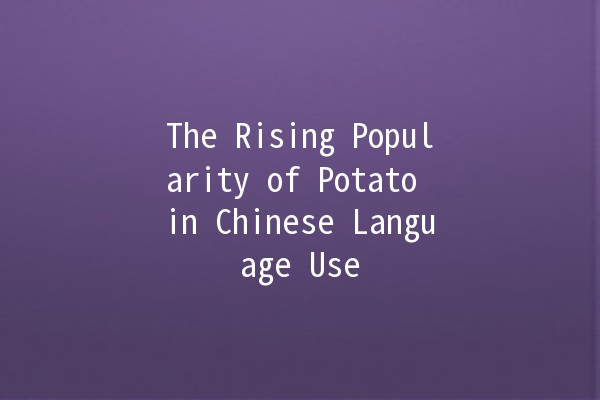In today's interconnected world, the Chinese language is experiencing a fascinating evolution, with various terms gaining increased popularity across social media platforms and everyday conversations. One such term that has surprisingly found its own niche in the Chinese language is "potato" (土豆). This article aims to delve into the reasons behind the rising usage of "potato" in Chinese culture, its implications, and how it fits into the broader context of language trends. Additionally, we will explore insightful productivityenhancing tips for language learners interested in the Chinese language.
Understanding the Popularity of "Potato" in Chinese
Cultural Significance
The word "potato" in Chinese refers to 土豆 (tǔdòu). While potatoes are a staple food in many cultures around the world, in China, they have taken on a unique significance, symbolizing comfort and simplicity. This plantbased food has been embraced not just for its nutritional value but also for its versatility in various dishes across different regional cuisines in China.

The Meme Culture
Moreover, the rise of meme culture, especially among young Chinese audiences, has propelled "potato" to iconic status. The phrase "土豆" is often humorously used in memes to symbolize simplicity or to describe someone who might be perceived as slowwitted or naive. This duality of meaning has allowed the term to spread rapidly across online platforms, creating a unique space for cultural commentary.
5 Effective Tips to Enhance Your Productivity While Learning Chinese
Learning a new language can be a daunting task, but with the right strategies, it can also be incredibly rewarding. Here are five effective productivity enhancement tips for mastering the Chinese language, specifically relating to the term "potato" and its cultural context.
Explanation: Using humor as a means of retention can significantly aid in remembering vocabulary. Try creating funny sentences or stories involving the word "potato."
Example: Imagine a story where a potato becomes a superhero, saving other vegetables from being turned into fries. This engaging narrative uses the term creatively, making it easier to remember.
Explanation: Engage with multimedia content such as videos, podcasts, and memes that include the term "potato." This exposure makes language acquisition more enjoyable.
Example: Platforms like Weibo and Douyin (Chinese TikTok) are filled with funny "potato" memes. Following accounts that post this content can help you learn colloquial usages of terms in context.
Explanation: Speaking with native speakers allows learners to see how terms are used in real life. This practice can be intimidating, but it’s invaluable.
Example: You could join language exchange groups where you discuss food – use "potato" as a conversational starter. For example, ask about people's favorite potato dishes, allowing the conversation to flow naturally.
Explanation: Maintaining a journal where you document new words and their contexts can be a great way to reinforce learning.
Example: Whenever you encounter the word "potato," write it down along with a sentence on how it was used. For instance, "我的朋友觉得我像个土豆" (My friend thinks I’m like a potato) captures both humor and context.
Explanation: Implement games and fun competitions into your study routine. This not only keeps you engaged but also encourages consistent practice.
Example: Create flashcards for different food items in Chinese, including "potato." Challenge friends to see who can get the most correct answers. This competitiveness can enhance your recall and make learning enjoyable.
Frequently Asked Questions
What is the meaning of "土豆" in Chinese?
"土豆" (tǔdòu) means "potato" in Chinese. It is commonly used in daily conversations and recipes, especially in northern cuisines where potatoes are a staple.
Why has "potato" become popular on Chinese social media?
The term has gained popularity due to its humorous usage in memes and its cultural symbolism. It represents simplicity and comfort, making it relatable for many users on social media platforms.
Are there any phrases related to "potato" in Chinese?
Yes, phrases like "土豆也是个好角色" (Potatoes are also good characters) have emerged in the meme culture, emphasizing the idea of finding value in simplicity or unexpected qualities.
How can humor help in learning Chinese?
Humor plays a critical role in memory retention. Creating lighthearted and funny content around language can facilitate better understanding and recall.
What are some popular dishes made with potatoes in China?
Some popular dishes include "土豆丝" (shredded potatoes), "土豆泥" (mashed potatoes), and "土豆炖肉" (potato stew). These dishes vary regionally and showcase how integral potatoes are to Chinese cuisine.
What are some online resources for learning Chinese effectively?
Several online platforms such as Duolingo, HelloChinese, and Memrise are excellent for learning Chinese, as they incorporate interactive methods and community learning, often featuring culturally relevant content.
The Cultural Impact of Language Evolution
As seen with the rising usage of "potato" among Chinese speakers, language is not static; it evolves and reflects culture, humor, and societal trends. Terms that may seem mundane can gain significant depth and relevance in different contexts, much like "potato" has done in Chinese discourse.
Understanding this linguistic evolution can enhance one's languagelearning journey and open doors to cultural understanding. By embracing language's dynamic nature, learners can find more enjoyment and motivation in their studies, paving the way for fluency and confidence in realworld conversations.
In summary, as we explore the fascinating case of "potato" in Chinese, it becomes clear that language learning is not just about memorizing words but embracing the fun and culture embedded in those words. So grab your virtual potato and dive into the lively world of the Chinese language!